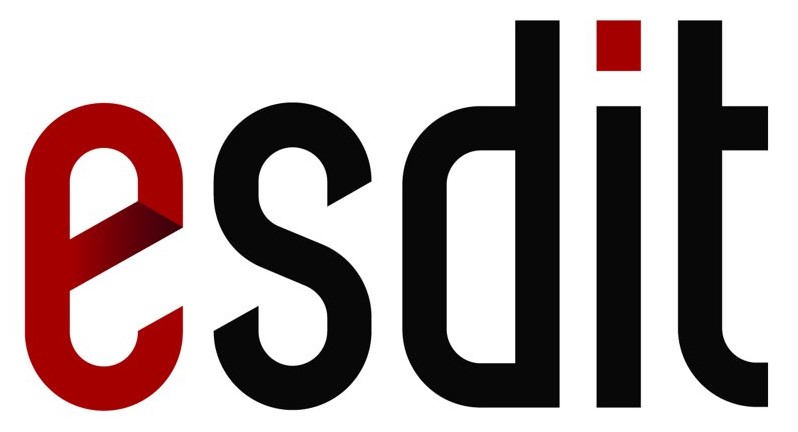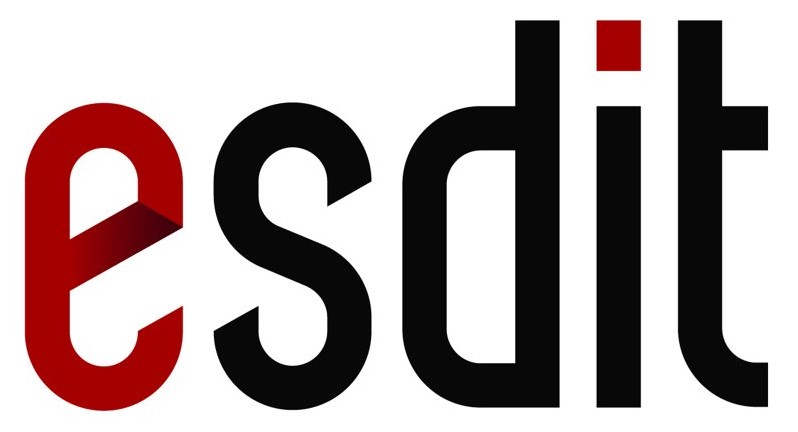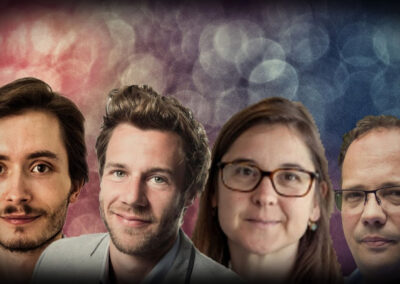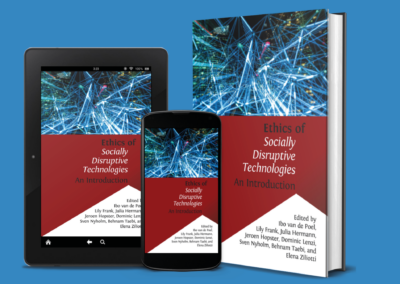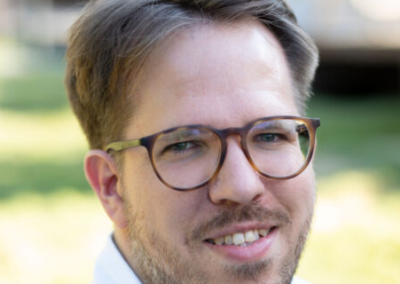Description of This Research Line
This research line Foundations & Synthesis aims to develop more synthesizing perspectives on the entire topic of the research programme. We work on frameworks that are able to provide normative responses to the challenge of SDTs. This involves the reconceptualisation of basic concepts. It also involves development of methodologies that are both sufficiently embedded in fundamental research in practical philosophy and capable of providing normative orientation with regard to concrete technologies. Ultimately these normative frameworks should find a place in the construction of new technologies and the development of regulatory frameworks.
We work on the following clusters of questions:
- How can we understand, in an integral way, the synergetic and emergent disruptive effects of a variety of SDTs on our understanding of nature, society, and human beings, and the challenges they create for the normative principles on which modern societies are based?
- How can we connect philosophical and ethical reflection on technology more intricately with technology development, implementation, and use? What innovations in the wider field of philosophy are suggested by our analysis of socially disruptive technologies? In which ways do socially disruptive technologies provide new opportunities to investigate old philosophical concepts, such as ‘nature’, ‘life’ and ‘the human being’ from new perspectives or in new ways?
- What new philosophical concepts, theories, and methods are required for the critical evaluation of socially disruptive technologies? What new normative concepts and principles are required to guide the development of SDTs? How can we develop new modes of interaction and integration between the philosophy and ethics of technology and relevant subfields of practical philosophy (applied ethics, political philosophy, philosophical anthropology, and meta-ethics)?
Related Projects
Technological Disruptions of Moral Concepts [1/9/2023-1/9/2027]
PhD candidate: Robin Hillenbrink (r.hillenbrink@utwente.nl)
Daily supervisor: Dr. Jeroen Hopster (j.k.g.hopster@uu.nl)
Supervisor: Prof. Dr. Philip Brey (p.a.e.brey@utwente.nl)
Project Description
The aim of this project is to develop a theoretical framework concerning the role of technology in the disruption of moral concepts, and to clarify the relation between conceptual, social, and moral disruption. The theory is to be validated and further developed by applying it to a set of moral concepts - which is to be determined. The theoretical framework should draw from theories of the relation between technology and society, as found in philosophy of technology, science and technology studies and related fields, and from theories of conceptual disruption and conceptual change, as developed amongst others in the ESDiT project in previous research. Furthermore, the project should connect studies of conceptual disruption with ethical theory. It should clarify how ethical studies of conceptual disruption relate to existing approaches in applied ethics, and to what extent they challenge or expand on these approaches.
The key research question for the project is: “How do socially disruptive technologies (SDTs) challenge and change moral concepts?”
Improving ethical analysis through better conceptualization of the moral role of technological products and systems [1/9/2023-1/9/2027]
PhD candidate: Haizea Escribano (h.escribanoasensio@utwente.nl)
Daily supervisor: Dr. Adam Henschke (a.henschke@utwente.nl)
Supervisor: Prof. Dr. Philip Brey (p.a.e.brey@utwente.nl)
Project Description
This project investigates how we can conceptualize the role of technological products in moral and immoral acts and events, and how this conceptualization can result in new and better approaches to ethical analysis. The focus is not just on single technological products with single users, but also on larger systems with multiple technological components and human operators. These include both sociotechnical systems – predominantly technical systems with human operators and enablers, such as an electricity networks, industrial production systems and the internet, and technosocial systems – predominantly social systems that rely on technology, such as modern organizations and associations.
The PhD candidate will investigate the different causal and moral roles that technology can take in morally consequential actions and events involving technologies with single users, autonomous technologies, and sociotechnical and technosocial systems. She will do so, initially, by studying and critiquing approaches in ethics (especially ethics of technology) that conceptualize the role of technology, and by making explicit what roles are assigned to technology. Also considered will be descriptive approaches to technology, users and society in STS, technology assessment and impact assessment and their possible translation to ethics. This is followed by the development of a new approach for ethical analysis which includes a vocabulary and methodology for understanding and assessing the various roles of various types of (socio)technological products and systems in moral actions and events. The approach will mostly be theoretical but will also involve a number of (smaller) case studies.
There will be a particular focus on socially disruptive technologies: technologies that transform everyday life, social institutions, cultural practices, and potentially even fundamental beliefs and values.
Conceptual engineering in the philosophy of technology [2022-2026]
PhD candidate: Samuela Marchiori (s.marchiori@tudelft.nl)
Daily supervisor: Dr. Michael Klenk (m.b.o.t.klenk@tudelft.nl)
Supervisor: Prof. Dr. Ibo van de Poel (i.r.vandepoel@tudelft.nl)
Project Description
Socially disruptive technologies (SDTs) affect our lives well beyond the confines of the technological domain. Among the many areas impacted by SDTs is the conceptual domain, where they may lead to instances of conceptual disruption. That is, SDTs are believed to challenge some of our concepts and, in certain instances, cause them to no longer apply. This calls for an assessment of such concepts to determine when and how they should be changed or adapted. Conceptual engineering, the practice of evaluating, designing, and implementing concepts, seems to be a good candidate to carry out such a task. This PhD project will develop criteria for guiding conceptual engineering projects in the philosophy of technology.
This project will contribute to three central goals of ESDiT, and of the F&S line in particular. First, it will contribute to the Conceptual Change & Disruption line, and provide essential input for others in the programme who want to argue that a particular concept ought to be changed in response to a particular SDT. Second, the project will connect theoretical and practical philosophy with debates in the ethics of technology, with a particular focus on the development of new methods in the ethics of technology to address challenges raised by SDTs. Finally, the project will provide a systematic approach to evaluating the conceptual impact of SDTs.
Methods of practical philosophy regarding socially disruptive technologies [2022-2025]
Post-doc: Dr. Björn Lundgren (b.a.lundgren@uu.nl)
Daily supervisor: Prof. Dr. Joel Anderson (j.h.anderson@uu.nl)
Co-supervisor: Prof. Dr. Sven Nyholm (sven.nyholm@lrz.uni-muenchen.de)
Project Description
The aim of this postdoc project is to investigate the following research question:
“Which methods in practical philosophy are best suited (and on what grounds) for (1) understanding the normative concerns that are raised by emerging technologies (particularly, their socially and conceptually disruptive character) and for (2) justifying revised philosophical approaches to those concerns?”
This project addresses a complex and multi-faceted range of issues. Some socio-technological developments may require fundamental rethinking of our normative accounts, while others can be addressed using familiar frameworks. Emerging and socially disruptive technologies may share distinctive ethical characteristics, but they may also differ fundamentally in the methods needed to analyze them. And the discussion of these issues occurs against a background of ongoing disputes about methodological pluralism and the relationship between more contextual methods and more principled methods in ethics, political philosophy, and related fields of philosophical and scientific inquiry.
How theories of technology and its relation to society can inform and transform ethics [2022-2023]
Post-doc: Dr. Kevin Scharp (k.a.scharp@utwente.nl)
Supervisor: Prof. dr. Philip Brey (p.a.e.brey@utwente.nl)
Project Description
The aim of this postdoc project is to investigate conceptual disruptions, especially those caused by socially disruptive technologies (SDTs), require responses in the form of conceptual engineering. What is conceptual engineering, what are appropriate methods, and how can conceptual disruptions caused by SDTs be responded to?
Qualitative investigation of STEM perspectives [2022-2023]
Post-doc: Dr. Michael Dale (m.t.dale@tue.nl)
Supervisor: Prof. Dr. Wijnand IJsselsteijn (w.a.ijsselsteijn@tue.nl)
Project Description
The aim of this postdoc project is to perform a multi-method empirical investigation and philosophical analysis of the ethical practices and mechanisms (e.g., safeguards, guidelines) employed by current scientific thought leaders in STEM (Science, Technology, Engineering and Mathematics) fields, CEOs, entrepreneurs and technical experts in relevant high-tech/biotech industries in order to create ethical awareness, assess ethical drivers and barriers, and raise ethical concerns. This includes the current form of ethical knowledge within high-tech environments, the role that ethical considerations play in pursuing, altering or discontinuing certain technological pursuits, and the extent to which ethical notions, considerations and practices are impacting current and future technology R&D, including the societal introduction and use of high-tech products and services. There will be a special emphasis on the extent to which currently used ethical concepts, methods and recommendations connect well with the practices in industry and policy regarding the disruptive or transformative potential and actual effects of technology.
Socially Disruptive Technologies and Conceptual Change [2020-2023]
Post-doc: Dr. Guido Löhr (g.lohr@tue.nl)
Daily supervisor: Prof. Dr. Vincent Müller (v.c.muller@tue.nl)
Project Description
The aim of this project is to understand the nature of conceptual disruption and conceptual change in the context of socially disruptive technologies. Concepts may change over time in several relevant respects. These include the meaning or intension, the scope or extension, and the preciseness or fuzziness. Conceptual change may be driven by internal developments in a scientific discipline, but also by external developments in society, such as technological developments or by normative developments. In this project we aim to answer a number of questions: What is the difference between conceptual disruptions and conceptual changes. How does a conceptual change or disruption exactly work and how can it be driven or caused by technological change? How can and should we adapt to conceptual disruptions and changes? Can conceptual engineering help us to overcome conceptual disruptions? Finally, what is the relation between conceptual change and moral change and what is the role of technology to promote moral progress?
Philosophical analysis of socially disruptive technologies and their role in transforming society [2020-2022]
Post-doc: Dr. Jeroen Hopster (j.k.g.hopster@uu.nl)
Daily supervisor: Prof. Dr. Philip Brey (p.a.e.brey@utwente.nl)
Project Description
This postdoc project analysed the general nature of socially disruptive technologies, the notions of social disruption and social transformation, and types (disruptive/transformative) impacts of technology on society, including impacts on institutions, social structures, cultural and epistemic practices, concepts, values and beliefs. Special attention has been given to theorizing the role of technology in ‘moral disruptions’ and ‘moral revolutions’, among others in relation to conceptual change. Also, the project has yielded a preliminary investigation of whether “socially disruptive technologies” constitute a sufficiently unified class to warrant a distinct ethical approach (an “ethics of socially disruptive technologies”), and how such an approach can be conceptualized.
Related Publications
(Online) manipulation: sometimes hidden, always careless Journal Article
In: Review of Social Economy, vol. 80, pp. 85-105, 2022.

Is it time for robot rights? Moral status in artificial entities Journal Article
In: Ethics and Information Technology, vol. 23, iss. 4, pp. 579-587, 2021.

Digital Wormholes Journal Article
In: AI & Society, pp. 1-3, 2021.

Recent Developments in Dutch and European Philosophy and Ethics of Technology Journal Article
In: Techné: Research in Philosophy and Technology., 2020.
Related Events
ESDiT & 4TU Ethics Conference Rethinking Ethics – Reimagining Technology

Join us at the Conference Rethinking Ethics – Reimagining Technology on 2-4 October 2024 at the University of Twente! Co-organized by ESDiT and 4TU Ethics (Centre for Ethics and Technology), the Conference aims to investigate what philosophy and ethics of technology mean today. It will gather scholars working on philosophy and ethics of technology and […]
People Involved
Coordination team
Participants
| Prof. dr. Joel Anderson |
| Prof. dr. Philip Brey |
| Dr. Michael Dale |
| Dr. Matthew Dennis |
| Haizea Escribano Asensio |
| Dr. Lily Frank |
| Dr. Julia Hermann |
| Robin Hillenbrink |
| Dr. Jeroen Hopster |
| Dr. Michael Klenk |
| Dr. Guido Löhr |
| Dr. Björn Lundgren |
| Prof. dr. Anthonie Meijers |
| Dr. Philip Nickel |
| Dr. Elizabeth O’Neill |
| Dr. Hanno Sauer |
| Dr. Mirko Tobias Schäfer |
| Dr. Sander Werkhoven |
